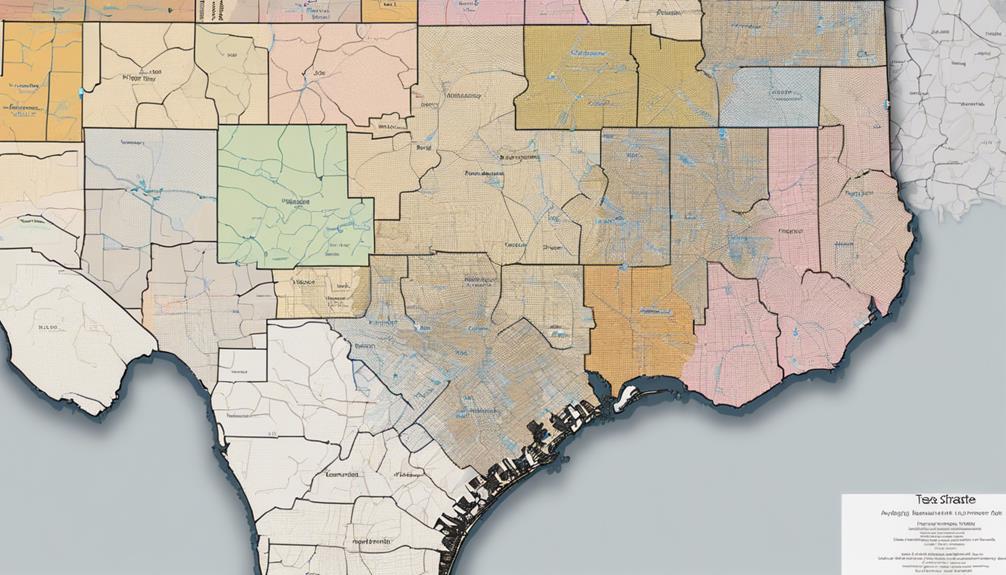To meet the residency requirements in Texas for a divorce, you need to live in the state for 6 months and in the specific county for 90 days. Proving residency means showing that you are physically present in Texas and have ties to the state. It’s important to have documents like utility bills and a driver’s license to prove your residency. Even military personnel can file for divorce in Texas, even if they are stationed elsewhere. There are exceptions for non-residents married to a Texas resident. Once you meet the residency rules, make sure to submit all necessary documents to the county clerk. Following these steps is key to having a smooth divorce process in Texas courts. Understanding these requirements is crucial for a successful divorce. If you want a successful divorce in Texas, make sure you meet all the residency rules and submit the necessary documents to the county clerk without any delays.
Key Takeaways
- Reside in Texas for 6 months and in the county for 90 days.
- Provide proof of domicile like utility bills or a driver's license.
- New residents must wait 6 months before filing for divorce.
- Exceptions exist for military personnel and non-resident spouses.
- Ensure all necessary documentation is accurate and up to date.
Texas Residency Requirement Overview
To meet the Texas residency requirements for divorce, individuals must have lived in the state for at least 6 months and in the specific county for 90 days. Texas law clearly outlines these residency requirements for anyone seeking a divorce in the state. Whether it's a same-sex or opposite-sex marriage, the residency criteria remain the same. Understanding these requirements is vital before initiating any divorce proceedings within the state.
Knowing that new residents must wait for 6 months before Texas courts can have jurisdiction over their divorce case is essential. This waiting period is a key factor in ensuring that all legal aspects are met according to Texas law. By submitting the Original Petition for Divorce and all necessary paperwork to the county clerk's office, individuals can kickstart the divorce process once residency requirements are fulfilled.
Familiarizing oneself with these fundamental residency conditions sets the foundation for a smooth divorce process in Texas, empowering individuals to navigate the legal system effectively.
How to Establish Texas Residency

Establishing Texas residency for divorce involves providing documentation that proves one's physical presence and ties to the state. To meet the Texas Residency Requirements, individuals must have lived in the state for a minimum of 6 months.
Proof of domicile, such as employment verification or real estate ownership documents, can be critical in establishing residency. Additionally, presenting documents showing physical residency, like utility bills or a driver's license with origination date, is essential for proving one's presence in Texas.
Meeting the residency requirement is fundamental for initiating the legal process of divorce in Texas. In order to fulfill the criteria, individuals may also need to provide additional documents such as tax returns or immigration documents to further substantiate their Texas residency status.
Meeting Residency Criteria for Divorce
When contemplating a divorce in Texas, it's essential to meet the residency requirements. These include living in the state for at least six months and in the particular county where you intend to file for divorce for 90 days.
Providing proof of domicile and physical residency is vital to establish eligibility for divorce filing in Texas.
Residency Requirements Overview
Meeting the residency requirements for divorce in Texas necessitates residing in the state for a minimum of 6 months prior to filing, along with establishing a 90-day residency in the specific county where the divorce petition is submitted. These criteria are essential for gaining jurisdiction in Texas family courts for divorce proceedings.
Texas law strictly enforces the 6-month state residency and 90-day county residency rules to commence the divorce process. To meet these requirements, individuals typically need to provide documentation such as utility bills, lease agreements, or official identification.
Ensuring you meet these residency criteria is vital for initiating a divorce in Texas and moving forward with the legal process efficiently.
Establishing Domicile in Texas
To establish domicile in Texas for meeting residency criteria in divorce, we can provide employment verification or self-employment earnings as proof. When aiming to meet the residency requirements, consider the following:
- Owning real estate or business documents in Texas can serve as proof of domicile.
- Showing a certificate of marriage with a Texas resident can help prove residency.
- Utility bills, driver's license with origination date, and voter registration card demonstrate physical residency.
- Tax returns, business licenses, or immigration documents can be additional proof of residency.
Proof of Residency Needed
Establishing domicile in Texas by providing evidence of residing in the state for at least six months is essential to meeting the residency criteria for divorce proceedings.
To meet Texas residency requirements, gather proof of residency like utility bills, a driver's license, or voter registration. Additionally, show documentation of establishing a domicile, such as real estate ownership papers, a marriage certificate, or business ownership records.
Include at least two documents demonstrating physical residency in Texas or consider a witness testimony to support your claim. Strengthen your case by submitting extra documentation like tax returns, business licenses, or immigration documents.
Verify all paperwork aligns with the legal standards to prove your residency in Texas for the divorce process.
Exceptions to Residency Rule

Exceptions to the residency rule in Texas can be significant for individuals seeking divorce who don't meet the standard residency requirements. When maneuvering the complexities of divorce filings in Texas, it's vital to understand the exceptions that can apply to non-residents and military personnel. Here are some key points worth noting:
- Non-residents can file for divorce in Texas if their spouse has lived in the state for 6 months or more.
- Military personnel who relocated due to service can still be considered residents of Texas for divorce filing purposes.
- Non-resident spouses must submit divorce petitions to the county where the domiciliary spouse resides.
- Periods of absence due to military service can count as residency in Texas.
Knowing these exceptions can help individuals in unique situations proceed with their divorce filings in Texas more confidently. By understanding these nuances, individuals can make certain they meet the necessary requirements even if they don't fit the standard residency criteria.
Filing for Divorce Out of State

When filing for divorce out of state in Texas, it's important to understand the process and any available residency waivers.
Texas courts may have jurisdiction over a divorce if the last shared residence was in Texas within the past 2 years.
Being aware of these factors can help navigate the complexities of filing for divorce from another state in Texas.
Out-of-State Filing Process
Considering the residency requirements and jurisdiction is essential before pursuing an out-of-state divorce filing in Texas. When filing for divorce out of state, certain factors must be taken into account:
- Confirm if Texas courts have jurisdiction over your case based on the last cohabitation.
- Understand how military service may impact your ability to file for divorce in Texas from out of state.
- Seek legal advice to navigate the complexities of meeting residency requirements for an out-of-state divorce filing.
- Be prepared to provide documentation and evidence to support your case when filing for divorce out of state.
Residency Waivers Available
Residency waivers in Texas allow non-residents to file for divorce if their spouse has lived in the state for 6 months or more, facilitating the process for individuals seeking a divorce out of state. Military personnel stationed here can also file for divorce in Texas, even if not physically present due to service obligations.
Non-resident spouses can submit divorce petitions to the county where their domiciliary spouse resides to meet residency requirements. Periods of absence due to military service count towards the residency requirement for filing divorce in Texas.
Exceptions to residency requirements apply to non-residents and military personnel seeking to file for divorce in Texas, making the process more accessible for those in unique circumstances.
Residency Rules for Special Cases

In special cases, specific circumstances may allow for exceptions to the standard residency rules for filing for divorce in Texas.
- Military personnel stationed in Texas can file for divorce after residing in the state for 6 months and in the county for 90 days.
- Public servants serving the U.S. or Texas government are considered Texas residents for divorce filing purposes.
- Non-resident petitioners can file for divorce in the Texas county where their spouse resides if the spouse has lived in Texas for 6 months.
- Spouses stationed on military bases in Texas must have been in the state for 6 months and in the county for 90 days to file for divorce.
In unique living situations, such as military deployment or diplomatic assignments, exceptions to the residency requirements may apply. These special circumstances recognize the challenges faced by military personnel, public servants, and non-resident petitioners, providing flexibility in meeting Texas residency criteria for divorce filings.
Finalizing Your Texas Divorce

After understanding the residency rules and meeting the necessary requirements, the next step in finalizing your Texas divorce is to submit the Original Petition for Divorce and required documents to the county clerk's office. Providing evidence of residency in Texas for at least 6 months and in the specific county for 90 days is vital to fulfill the residency requirements. By meeting these criteria, you establish the court's jurisdiction over your divorce case, ensuring a smooth legal process.
Remember, even if you're a military personnel stationed elsewhere, you can still establish residency in Texas for divorce filing purposes by meeting specific criteria. The county clerk's office will process your paperwork efficiently, moving your divorce proceedings forward. By following these steps and submitting the necessary documentation, you're one step closer to finalizing your Texas divorce and moving forward with your life.
Trust the process, and soon you'll achieve the liberation you seek.
Frequently Asked Questions
How Do I Establish Residency for Divorce in Texas?
We establish residency for divorce in Texas by meeting specific time requirements. Living in the state for 6 months and the county for 90 days is key. Providing proof like utility bills or a license helps.
What Is the 10 Year Rule in Divorce in Texas?
We comprehend the 10 Year Rule in divorce in Texas. It refers to the duration of marriage needed for spousal maintenance. Courts may award support if the marriage lasted at least 10 years, considering it crucial for financial assistance post-divorce.
How Does Texas Determine Residency?
Texas determines residency based on physical presence. Living in Texas for 6 months establishes state residency, while residing in a specific county for 90 days allows filing for divorce in that county. Meeting these requirements is important.
How Long Do You Have to Live Apart to Be Legally Separated in Texas?
Living apart is unnecessary in Texas for legal separation. Residency requirements are essential for divorce. We must reside in Texas for six months and the county for 90 days to start the process.
Can Meeting Residency Requirements Help with Uncontested Divorce in Texas?
Meeting residency requirements is crucial for an uncontested divorce in Texas. Both parties must have lived in the state for at least six months prior to filing. This is a key factor in determining eligibility for an uncontested divorce in Texas.
Conclusion
To summarize, meeting Texas residency requirements for divorce is essential for a successful legal process. Remember, 'you can't have your cake and eat it too' – meaning you must establish residency in Texas to file for divorce in the state.
By understanding the criteria, exceptions, and special cases, you can navigate the process effectively. Stay informed, follow the rules, and consult with legal professionals to guarantee your divorce proceedings go smoothly.










